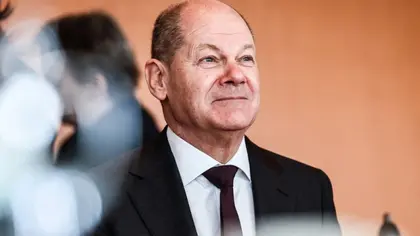Germany’s ruling Social Democrats are edging towards a rift over the government’s Ukraine policy as a group of notable historians within the party denounced Chancellor Olaf Scholz’s “ambiguous rhetoric” towards Russia.
Some Social Democrats fear that Scholz’s emphasis on keeping Germany out of the war by refusing to send Taurus long-range missiles to Kyiv has turned into a revival of the party’s former dovish approach to Russia.
JOIN US ON TELEGRAM
Follow our coverage of the war on the @Kyivpost_official.
This comes as a group of five renowned intellectuals, who are also SPD members, including historian Heinrich August Winkler, wrote a letter to the party’s leadership criticising Scholz’s stance on Ukraine and Russia.
“As [party members] and scientists, we are watching the SPD’s position on Russia’s war of aggression against Ukraine with growing concern,” they wrote in the letter, which emerged on Wednesday (28 March).
“The Chancellor and the SPD leadership drawing red lines, not for Russia, but for German politics, weakens Germany’s security policy and benefits Russia.”
Despite having announced a ‘Zeitenwende’, a turning point for Germany’s foreign policy that included increased defence spending and military aid to Ukraine, Scholz has so far not shown the necessary “clarity and unambiguous solidarity”, the historians argued.

‘Ukraine Doing Everything to Ensure 2025 Becomes a Year of Lasting Peace’ – Ukraine at War Update for Dec. 25
While the German chancellor has pushed Western allies to increase military support to Kyiv, he has so far avoided calling for a Ukrainian victory.
The group of historians now stated they want the Social Democrats to “finally come up with a strategy for a Ukrainian victory” as Russian President Vladimir Putin “only has an interest in ending the war if he is confronted with force”.
It is not the first time that Scholz has been criticised on the subject from the ranks of his three-party governing coalition, though his own party has remained mostly quiet.
Scholz’s SPD has a history of being accused of pursuing politics too lenient towards Moscow – critics call the advocates of this leniency ‘Russlandversteher‘ – which they link back to former German Chancellor Willy Brandt’s Ostpolitik during the Cold War.
Earlier this month, the party saw an uproar after calls emerged for Ukraine to move towards negotiations with Russia, with the SPD’s parliamentary leader suggesting the need “to think about how to freeze a war”.
In their letter, the historians criticised that “the policy pursued by some [members] under the buzzword ‘party of peace’ operates with a short-sighted idea of peace.”
The critique comes as one of the SPD’s vocal proponents of military support for Ukraine, Michael Roth, an MP and former Europe minister, announced that he would step down at the next election, citing the soured atmosphere over the issue as a reason for his departure.
Scholz has so far rejected any criticism of his approach, which he reaffirmed on Wednesday (27 March).
“I am sure that many citizens agree that the issue of security in Europe is in good hands with my government and with me,” Scholz told reporters after a meeting with Latvian Prime Minister Evikan Silina.
You can also highlight the text and press Ctrl + Enter






